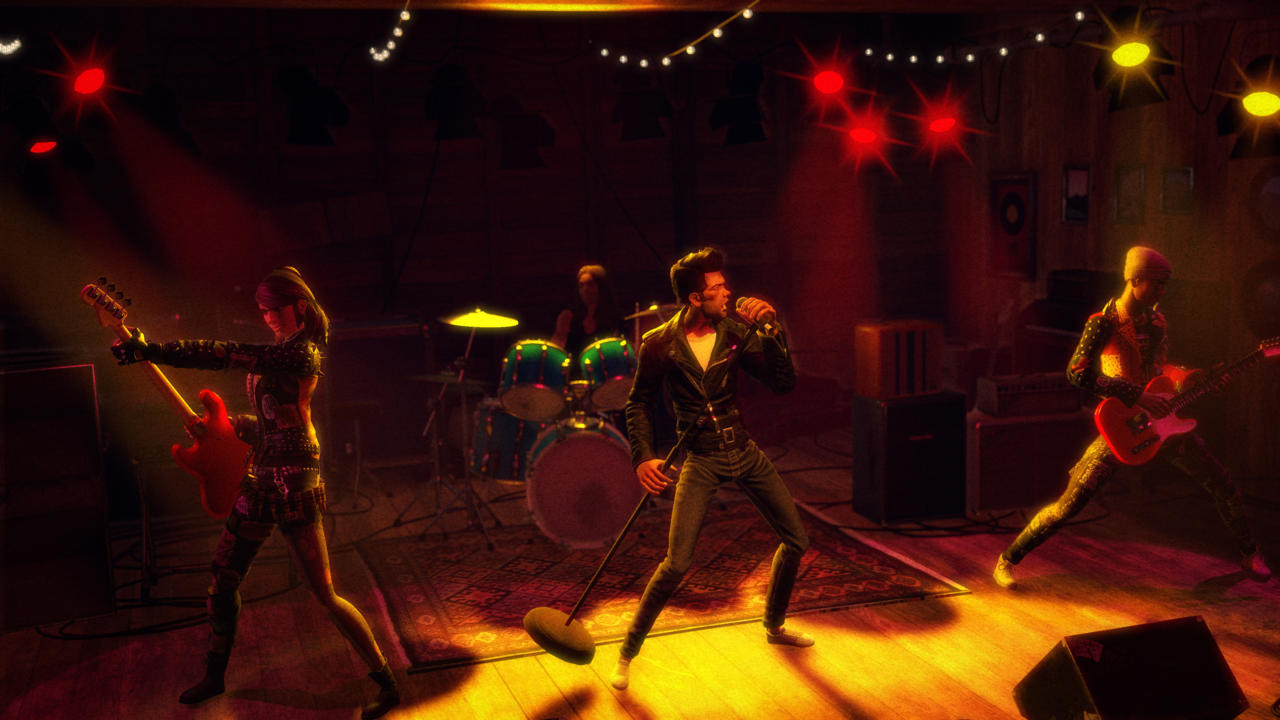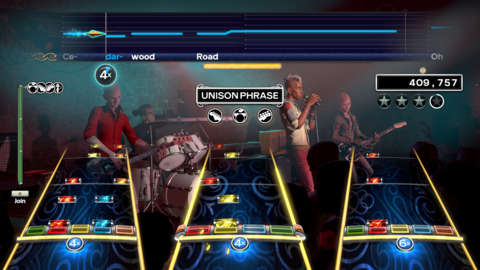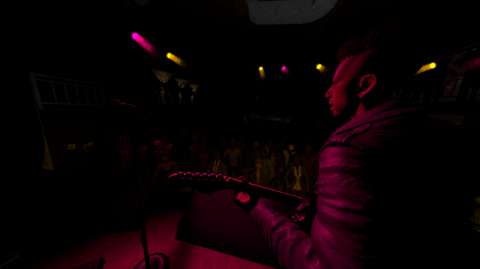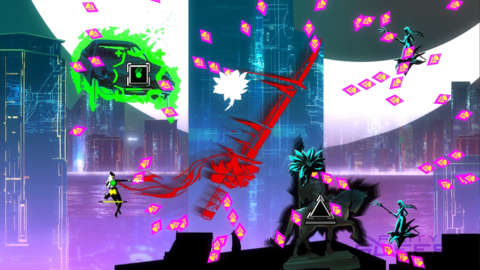The story of famed rhythm game developer Harmonix is a dramatic one. What started as a small software company experimenting with digital music creation grew into a promising game studio with the release of cult hits Frequency and Amplitude before absolutely exploding into mainstream popularity with the back-to-back successes of Guitar Hero and Rock Band--both of which became far-reaching cultural phenomenon. Unfortunately, Guitar Hero was wrenched away when publisher Activision acquired the rights, Rock Band eventually became the subject of several lawsuits, and the hype surrounding full-band rhythm games evaporated after just a few years.
But Harmonix refused to quit. After breaking from then-owner Viacom in late 2010, the studio dove into dance games and other assorted projects before finally circling back to its cornerstone franchise with Rock Band 4, which released last fall. Most recently, Harmonix launched a crowdfunding campaign on Fig to bring Rock Band 4 to PC, a strategic choice that was met by mixed reactions from fans. With so much riding on Rock Band, we decided to sit down with current CEO Steve Janiak to discuss Rock Band PC, as well as the current state and long term future of both the franchise and Harmonix as a whole.
Let's start with the obvious question: why bring Rock Band to PC, and why now?
Janiak: Well, customers have indicated interest for PC for quite a long time. There's a short list of things that customers have asked for for many years, and PC is one of them. During the time between Rock Band 1 and Rock Band 4, the PC market has grown tremendously for gaming. I mean Steam is a huge marketplace, bigger than consoles combined right now, so we know there are gamers there.
The consoles are also more similar in their architecture to PC than they've been in the past, so it's a more straightforward port for us to take the software from PlayStation 4 and Xbox One onto PC. It would have been much, much more expensive some number of years ago.

Why did you guys decided to turn to a crowdfunding platform as opposed to funding it all yourselves?
A crowdfunding platform is a good way to actually test the market and see if there actually is demand for that. We know there's some demand, but the question is, how much demand is there? Then as an independent developer working on many projects, we have quite a few things that we're doing. We have three VR projects, for example. We continue core Rock Band development. We can't actually do all the things at one time, so the Fig is actually going to help us raise money to pay Sumo Digital, which is a great developer, to actually do the core PC port.
Why hire a third-party developer to create the PC version rather than doing it in-house? Is it simply a question of manpower?
Yeah, it's a question of which things are we uniquely suited to do well. We built the core game and we're continuing to build the core game, so rather than shifting any development resources off of building new features for Rock Band 4, we thought we'd work with a house that actually has a core competency in making PC ports. That's the most effective, efficient way for us to get a PC port done while at the same time building out the feature set for the core Rock Band 4.
We are building the [Rock Band Network], so that's not outsourced, and we're also doing the PC engine work. So the majority of the work for the PC port will be Sumo, but there is some work that we are doing in our engine.
When we published the news that you'd be crowdfunding the PC version, a lot of the comments basically said, "How does Harmonix not have tons of money already, given the success of the Rock Band series? Why do they need money from the fans?" What's your reaction to those types of comments?
Well, Rock Band had been a product Viacom. As an independent developer, we don't have access to the funds that MTV Games had. We don't have other businesses to fall back on or extra funding lying around to just do a ton of pet projects. Rock Band has been a thing that we wanted to make sure was available for this generation of consoles. We raised some money last year, we had some equity investment that we took on, and we're doing pretty well with Rock Band, but we are not a gigantic corporation. We're not really in a position to just sort of fund everything.

Roughly two years after Harmonix broke away from Viacom, Harmonix won a well-publicized lawsuit against Viacom that resulted in a roughly $383 million payout. A lot of people seem to be curious about where that money's gone.
That was a shareholder lawsuit, so that was actually all the investors of Harmonix basically arguing their case for how much the buyout was supposed to be for. That actually has nothing to do with Harmonix. There were a lot of investors in the original Harmonix and they put a lot of money into that studio. They had a lot of faith in it, they took a lot of risk, and that lawsuit is about their return on that investment. It's not in any way connected to Harmonix today.
In light of this crowdfunding effort and what appeared, at least from the outside, to be a mixed reception for Rock Band 4, I was curious if you could comment on the strength and internal state of Harmonix today.
We're doing pretty well. We've got some money from equity investment. Rock Band 4 is bringing in quite a lot of revenue for us. We have a number of funded projects from other publishers. Financially we're doing well. We're not, again, a gigantic corporation, but for an independent studio we're actually doing really well. I think we're making the right investments and we're seeing return on our investments.
Then just in terms of like the studio vibe, people seem very happy. Folks are really excited about the new features in Rock Band, and we've been pivoting the studio towards more and more VR projects. Some of them are public, some of them are not. As we see these platforms actually launch on to the market and as we're able to show folks--like this week we showed them Music VR and we showed Rock Band VR--folks get energized by that because we're doing some really innovative things in VR.
Does it feel like a risk to be focusing so heavily on VR given that the medium is somewhat unproven at this point?
It doesn't actually feel like a huge risk to me. I think there's a tremendous amount of opportunity within VR to reinvent the way people interact with music. We can do a whole bunch of stuff that we have never been able to do. I mean, basically Rock Band should be VR. The sort of emotional immersion aspect of Rock Band that we've always tried to deliver through the console is unbelievable in VR. I think our ideas work really well there, so I'm excited creatively.
Then in terms of the market adoption, Gear VR's done pretty well, actually, as one of the first consumer VR techs that's been available for folks to purchase. There's already an install base for that product, for example. PlayStation, I think there's a lot of pent up demand for this. Sony's been talking about PlayStation VR for a while. I think Oculus is going to do whatever they need to do to really build out their platform. They've got a multiyear plan to bring people to their platform.

I don't think so many large companies would be in this space putting quite a lot of money behind the hardware development, but also the marketing of it, if it weren't going to be something that consumers probably will adopt. I think we will offer some of the best VR experiences early on, and that's a great position to be in.
Can you expand on what VR allows you to do creatively that you weren't able to do previously?
The sense of space when you're in [Rock Band VR] and looking at your bandmates and being acknowledged and interacting with the crowd in that space, I mean really just it's incredible. Everyone's using the term "immersive," but it's emotionally powerful in a way that we've always wanted Rock Band to be.
What you saw so far is what we call "classic mode," so it involves beat matching, and we have those little monitors so you can follow along. What we show next will be very different than that. Obviously some of the fun of being in this virtual environment is looking away from the monitors, actually doing interactions that don't involve following a pattern. You basically will have the freedom to interact in this space the way you want to. You will be playing the game, but you will not need to look at a note highway.
Mechanically, Rock Band VR seems pretty easy to wrap your head around. It's Rock Band in VR! But I'm not quite as familiar with Harmonix Music VR. Can you give us the quick bullet points of what players can expect from that experience?
It's like the old [audio visualizer] Winamp. That was a unique and innovative product at the time; people would play music and stare at the thing. It was fun back then. Now in 3D space, there are way more complicated and interesting, crazy interactions that we can do while visualizing your music. It's any song that you have, any of your own actual music, combined with a bunch of different landscapes that change with the music. It's not a game, but there are interactive portions. A couple of the worlds are actually very interactive, and a couple of them are a little bit more passive
One of those worlds we're calling "The Easel" and it allows you to use the Move controllers to essentially create visual representations of music in 3D space. It's interesting in the same way that Tilt Brush is interesting, but ours is really more about musical interaction.
With Rock Band 4, we were able to build the thing that we all wanted to do. We didn't have to check with anybody. We didn't have to get any approval from any organization.
Steve Janiak, Harmonix CEO
Outside of VR, what's next for Rock Band and Harmonix? Can you talk at all about your plans with new hardware partner PDP?
We have new hardware coming this fall. It's the first new hardware in six years for Rock Band. We'll announce more about it in the coming months, but it looks cool, it's a little different, and, yeah, we're excited to have new stuff out there. You know the existing instruments will continue to work, and Mad Catz is continuing to sell them, so we're still working with Mad Catz. But for the new products that we'll start launching this fall, PDP has been a great partner.
Rock Band 4 will be around for this entire console generation. It's a platform that we intend to support for years. We've been supporting it with free title updates. There are some features coming that we've already announced, like set lists and practice mode. We have a major, major update coming this fall and we won't get into the details as of yet, but I think folks will be pretty happy. The whole idea of this as a platform is to listen to the fans, hear what they actually want us to build, and then deliver it.
How has operating as an independent studio impacted the way Harmonix works? Did that influence the development of Rock Band 4 in any way?
With Rock Band 4, we were able to build the thing that we all wanted to do. We didn't have to check with anybody. We didn't have to get any approval from any organization. There were a bunch of pretty crazy prototypes that were going around for a couple of years. We had been trying to work on musical expressivity, like actually being able to not just follow the note highway and improvise a bit, which became the freestyle guitar solo feature. We're really interested in providing non-musicians a way to feel like [they are] creating music. That was one of the main things we really wanted to go after with Rock Band 4, and that probably wouldn't have been a priority for, say, an MTV Games.

Would Harmonix ever consider branching away from music games and make another game like A City Sleeps?
We have those conversations at the studio a lot. We have a lot of different ideas, incredibly creative people at the studio, and there are only so many things you can make. I don't know that we will ever get away from music games, but I think that the definition of a music game is debatable. There are all sorts of things that we can do that aren't literally rhythm gaming, certainly aren't beat-match. You just gave an example of one, and we had some other ideas that are a little bit more like that, so yeah, possibly.
I think music is one of those things that's universally loved by almost all humans, and if you can bring that into gaming in a way that makes sense, that feels intuitive, that puts you in an emotional flow state. I think people are going to be interested in those experiences--and they have been. I think they will be increasingly as we release some new types of things later next year.

